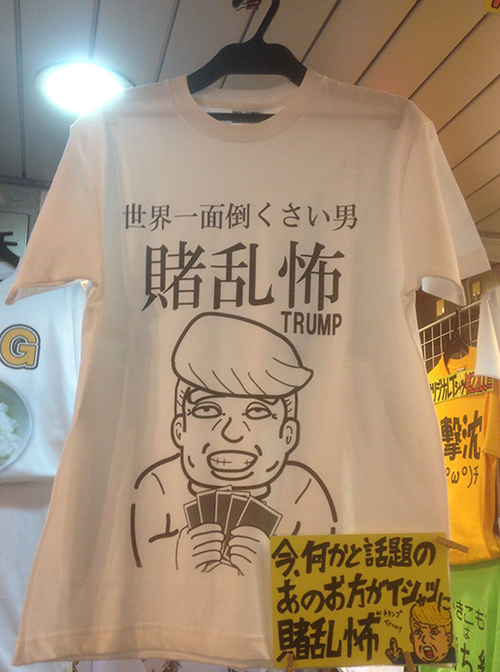Sushi on the Head and Days Gone By
Part of me feels that this should be a Trump-free zone because we're all inundated with miserable political news, and kanji should provide a respite. Then again, some things are too good to pass up, and anyway it's important to know how the Japanese view the unfolding disasters in the United States.
So it is that I'm going to present you with a quiz about this picture:

Photo Credit: Lutlam
The question is not "Why does he have sushi on his head?" Rather, it's this:
Why is Trump holding playing cards?
a. He's pulling a fast one, like a casino dealer
b. He's being secretive, like a poker player
c. He thinks he has a poker face but is in fact completely transparent
d. There's a connection between his name and cards
I'll block the answer by explaining the three large kanji above "TRUMP." They represent his name, but they constitute the kind of ateji in which only the sounds of the characters matter, not the definitions. Still, the kanji weren't chosen completely at random; they all have negative meanings:
賭 (ト: gambling)
乱 (ラン: confusion; disturbance; random; reckless)
怖 (フ: fear; scary; afraid)
Put it together and you have トランプ (notice the phonetic change to the フ), which is how the Japanese media render his name, not with that cruel kanji concoction!
Okay, now for the quiz answer.
d. Trump is holding playing cards because トランプ (trump) is the Japanese term for "playing cards"!
Above 賭乱怖 on the shirt we find this:
世界一面倒くさい男
world's most troublesome man
世界一 (せかいいち: number one in the world);
面倒くさい (めんどうくさい: troublesome);
男 (おとこ: man)
Hey, look at that. He's number one in the world! I'm sure that would be his takeaway from this!
The yellow sign says the following:
今、何かと話題のあのお方がTシャツに賭乱怖
The man in this news or that—he's now on a shirt: TRUMP
今 (いま: now); 何かと話題の (なにかとわだいの: becoming this topic or that); お方 (おかた: person, stated in honorific language)
Trump has stirred up a whopping case of escapism in me, and Mary Tyler Moore's death provided just the fodder. I couldn't wait to revisit episodes of The Mary Tyler Moore Show, leaving 2017 far behind. I just don't want to live in this era. I've never once felt that way before. Initially, it was great to see Mary and the gang again, but I soon realized that the early shows had really stupid plots, so I shifted over to The Bob Newhart Show. I'm finding more intelligence there while fully reliving the 1970s, plaid and all. I look at the clunky old phones with their long, coiled cords; the dopey-wifey role that Suzanne Pleshette plays; the huge and distracting shirt collars; the ugly shag hairstyles; and the drabness of everything about that decade—and it still seems more appealing than the place we're in right now!
How fitting, then, that I just published essay 1997 on 憬 (to yearn, long for; aspire to; admire; adore), which has a great deal to do with yearning for the past. For instance, it covers a festival in which bamboo lanterns illuminate Edo-era buildings along a "Path of Yearning," likely a conscious bid to stir up nostalgia for those bygone times.
The essay contains this sentence, featuring 憬れ (あこがれ: yearning, longing):
我々は過ぎ去った日を、必ずしも愛情とは言えないまでも少なくとも一種の憬れを持って振り返るのである。
We look back on days gone by, if not always with affection, at least with a kind of wistfulness.
我々 (われわれ: we); 過ぎ去った日 (すぎさったひ: days gone by); 必ずしも ... ない (かならずしも ... ない: not always); 愛情 (あいじょう: affection); 言う (いう: to say, shown here in its negative potential form); 少なくとも (すくなくとも: at least); 一種 (いっしゅ: a kind); 持つ (もつ: to have); 振り返る (ふりかえる: to look back on)
We sure do!
By the way, while I was researching the bamboo lantern festival, I came upon this great word:
昼行灯 (ひるあんどん: person who does not stand out; (useless as) a lantern at noon)
Come to think of it, I believe I encountered that term several (oh-so-missed) years ago. But in light of the extraordinary displays we've seen with Trump, this word takes on new meaning. A person who doesn't stand out ... I remember how people mocked dull presidents in earlier decades, but wouldn't any of them be preferable to a braggart who puts all the attention on himself?!
Please whisk me back to the 1970s! Maybe then I'll remember just how awful they were—and (as Woody Allen argued so well in Midnight in Paris) I could then dream about living in the 1920s!

Comments